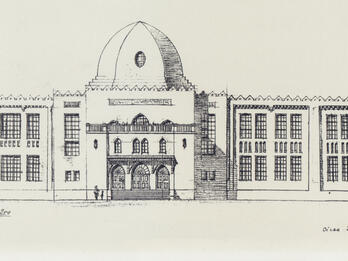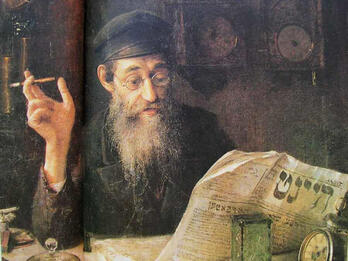Kehillah Meeting Address
I would like to say that this meeting is a meeting of the members of the Executive Committee and of the Advisory Council of the Kehillah. It is not a meeting that is open to the public or to the press, and I would therefore ask each member of this meeting kindly to refrain from giving any report of it to the press on his own account. If it should be decided that a press account be made, the meeting can appoint a committee for that particular purpose.
The meeting is called, as you are aware, for the purpose of considering questions that have come up in connection with the Rosenthal gambling case. There is hardly any need for me to mention to you what this particular case is, what the importance of it may be for this city [New York], and particularly for the Jews of this city.
About two weeks ago, a Jewish gambler was shot down in a lighted street. Since he was shot down, statements have been made—and even before he was shot down, he himself made statements to the effect, that there was an intimate connection between gambling and other vices, and the Police Department or individual policemen of this city. The city has been thrown into excitement not because this particular man was shot down, and not because his statements were new—but because it was thought and because it is thought that there is a chance at the present time, once and for all, of either proving or disproving the statements that have so often been made, but never legally proved, that there is this intimate connection between gambling on the one hand and the police with their protection on the other hand. This is, of course, a question for the city government to take up. It is a question for the Police Department to investigate. It is a question for the District Attorney’s office to press forward in the courts; and it may well be asked on this account, just what business it is of the Jews of this city or of the Jewish Community, the Kehillah, to busy itself with this particular subject.
There are those who say that this is not in any sense a Jewish question. And it is not a Jewish question because, after all, there are others but Jews who are gamblers, the Police Department is not made up of Jews, and the Jews of this city by no means hold a monopoly upon the vice of the city. It is not a Jewish question, either, even if we consider the responsibility of Jews, because the responsibility rests upon the whole city, and not upon the Jewish community alone. These conditions are due to general causes, not specifically by any means to Jewish causes. Nevertheless, a serious matter such as this does intimately concern the Jews of this city, and I think, no body of men more closely than the Kehillah, which pretends to be a representative Jewish body of all sections of the city. It concerns us particularly because of our own responsibility. We are responsible, so it seems to me, in part for the conditions that have arisen. We have not given our boys and our girls the education that they deserve, we have not looked forward to the organization of the community as it was growing by leaps and bounds, as we should have looked forward to it, so that the Jews of the city are, in part at least, responsible for such conditions as have arisen. We are responsible, also, to the city in which we live, to help the city clean out the criminals that may infest it. And we are responsible to ourselves, to the healthy development of Judaism to clean out our own household, because if we do not clean out our own household, there are others who will come and do it for us. It seems to me that the time has come when we must lay aside all of the masks that we have hitherto placed before our eyes. We must try to face the facts of this city as they are. Up to the present time, we have been constructing an ideal picture of the Jew. We were not willing to believe that conditions of degeneracy, and of moral breakdown and of chaos had overtaken us. When the cry of white slavery—or, let us go back a little bit further, when Police Commissioner Bingham declared that fifty per cent of our criminals were Jews, we arose and we denied these statements, as we should have denied them, because they were exaggerated. We did not, however, put ourselves to the problem of cleaning out whatever vice there was, whether fifty per cent, or twenty-five per cent. When the charges of white slavery were made, we refused to believe that Jews were engaged in this traffic. We entered upon certain pilpulistic distinctions between white slavery and prostitution, between this form of a cadet and that form of a cadet; and when we had satisfied our conscience in the matter and believed that we had done our duty, we sat back and felt that there was nothing more that we could do.
As far as I can see, however, a crisis has come upon the Jewish community of this city, by reason of this particular matter. The people on the streets are saying things about the Jews that it is not an honor for us to have said about us. We are being told that we are the criminals of this city; and, unfortunately, to a large extent, we do furnish criminals, and unless we throw off all of this nonsense about the Jews not being capable of committing this crime or that—unless we take this matter up firmly as Jews, and tell the community that we are doing this as Jews—as citizens also, but as Jews as well—the citizenship of this community will say to us that we have not done our duty, and it will inflict upon us that measure of punishment that we deserve. Any one of us here, I am sure, acquainted with Jewish conditions in the city, could have predicted an explosion like this with almost mathematical certainty. I am sure that we have all of us asked ourselves, when is it going to come, because we know how low many hundreds and perhaps thousands of our men and women, particularly our younger men and younger women, have sunk. The explosion has come, a crisis is upon us, and I think it becomes us as men and as Jews, squarely to face this, and to try to lay our finger upon the sore spot, and to try to cut it out if we can, and to show where the blame lies, and where the remedy is to be found. [ . . . ]
But I believe that the only hope for us, for ourselves and for the healthy development of Judaism among our children and for our good name in this city; and also, in addition to our good name, for the sake of the city itself, because we owe a duty to the city itself to clean out our section of it out [sic], at least to help the city become clean and high-toned. And the only way we can do this is to take hold of the emotions of our people and stir them, as perhaps they never have been stirred before; and the only way is to get a thousand young Jews and Jewesses, young lawyers, physicians, school-teachers, business men—see how many of them we have—who are simply silent in the presence of all of these things, because they do not know what to do. If we can get them active, interested, enthusiastic, antagonistic at all of this!
Credits
Published in: The Posen Library of Jewish Culture and Civilization, vol. 7.




